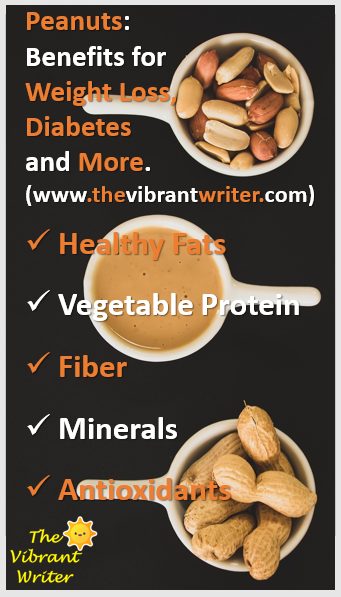
Nuts should be an important part of your diet but many calorie conscious folks stay away from nuts as they are high in calories. Nuts like peanuts are beneficial for health if they are eaten in reasonable quantity. An ounce (30 grams) peanuts will give you all the health benefits plus the satisfaction and would not be heavy on your waistline.
Make sure you keep a digital kitchen scale to measure the exact quantity. One ounce may not sound a lot but it is quit satisfying and can be eaten as a healthy snack or can be added to your salad if you like a little nutty crunch. Peanut butter is another healthy option. A spoonful of peanut butter can satisfy your sweet tooth. You can add it to your smoothie to give it a creamy texture. You can use also use Peanut Butter as a dip for your vegetables sticks like celery, cucumber or carrots.
One ounce or 30 grams of peanuts contains 170 calories, 7 grams of protein, 6 grams of carbohydrates, including 2 grams of fiber, and 15 grams of fat, including 2 grams of saturated fat. It provides you with 20 percent of the daily value for niacin; 10 percent of the DV for folate, phosphorus and magnesium; 8 percent of the DV for thiamine and smaller amounts of zinc, iron, vitamin B-6 and calcium. These nutrients help stabilize blood sugar, and help you avoid the hunger swings that can happen when you snack on high-carbohydrate refined foods like rice cakes and cookies.
5 Benefits for Weight Loss, Diabetes and More:
- Healthy Fats: Peanuts are rich in Healthy Fats. They have a high satiety value that keeps one full for long.
- Vegetable Protein: Peanuts are a good source of a plant-based protein. The high content of protein and monounsaturated fat in peanuts increases the metabolic rate.
- Fiber: Peanuts are a great source of insoluble dietary fiber, which makes peanuts a weight-loss-friendly food. They reduce food intake by promoting fullness to a greater extent than other common snacks, such as rice cakes.
- Minerals: Peanuts are an excellent source of various vitamins and minerals, including Biotin – Peanuts are one of the richest dietary sources of biotin, which is important during pregnancy. Copper – A dietary trace mineral, copper is often low in the Western diet. Deficiency may have adverse effects on heart health. Niacin – Also known as vitamin B3, niacin has various important functions in your body. It has been linked to a reduced risk of heart disease. Folate – Also known as vitamin B9 or folic acid, folate has many essential functions and is especially important during pregnancy. Manganese – A trace element, manganese is found in drinking water and most foods. Thiamine – One of the B vitamins, thiamine is also known as vitamin B1. It helps your body’s cells convert carbs into energy and is essential for the function of your heart, muscles, and nervous system. Phosphorus – Peanuts are a good source of phosphorus, a mineral that plays an essential role in the growth and maintenance of body tissues. Magnesium – An essential dietary mineral with various important functions, enough magnesium intake is believed to protect against heart disease
5. Antioxidants
Peanuts are rich in antioxidants. Vitamin E – A powerful antioxidant, this vitamin is often found in high amounts in fatty foods. Resveratrol: A powerful antioxidant that may reduce your risk of cancer and heart disease, resveratrol is most notably found in red wine. Isoflavones: A class of antioxidant polyphenols. Phytic acid: Found in plant seeds, including nuts, phytic acid may impair the absorption of iron and zinc from peanuts and other foods eaten at the same time. Phytosterols: Peanut oil contains considerable amounts of phytosterols, which impair the absorption of cholesterol from your digestive tract.

Kindly do leave a Comment below or by clicking “Comment” link under the Title of the Post, I Would Love to Know Your Opinion on this article.

